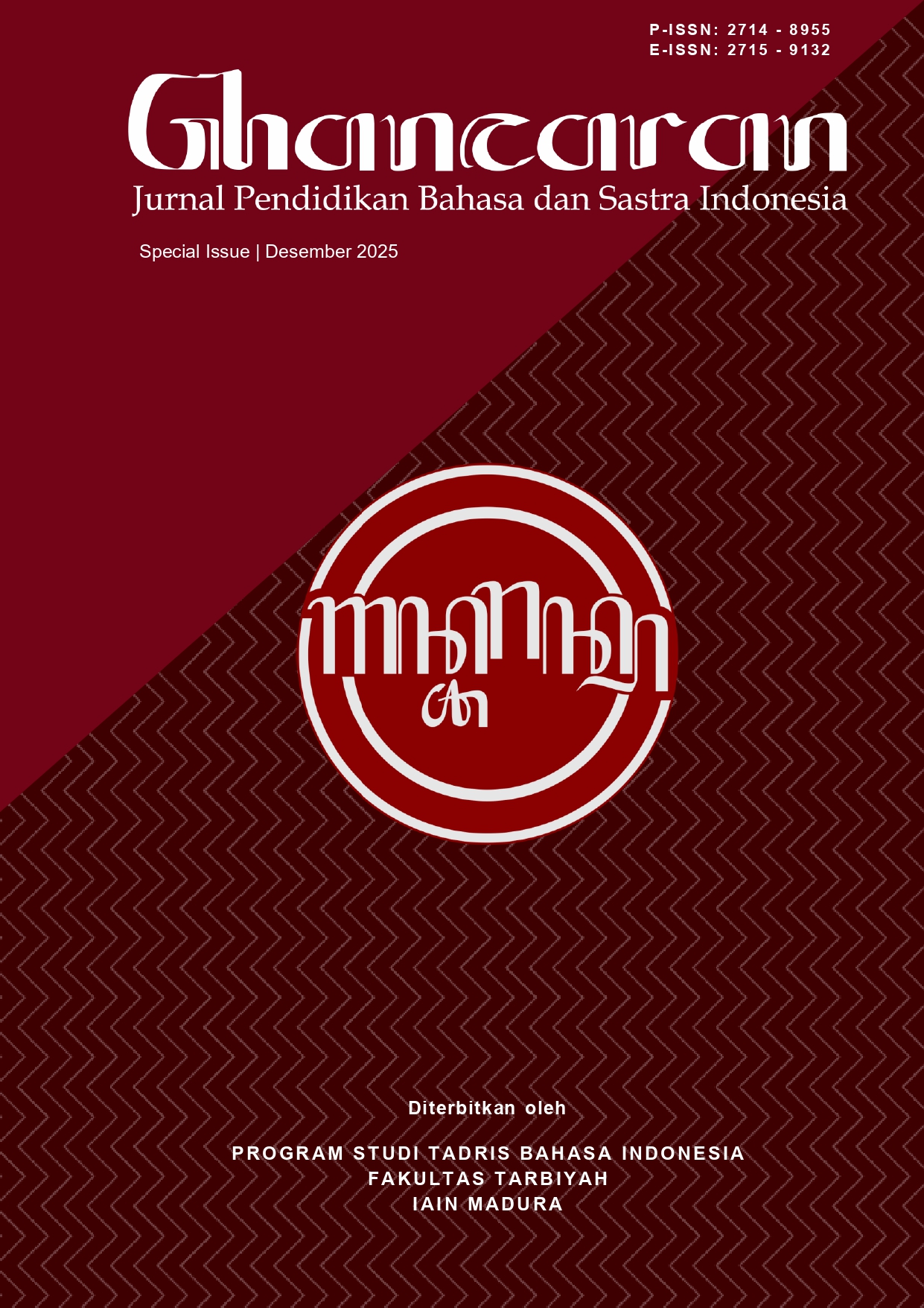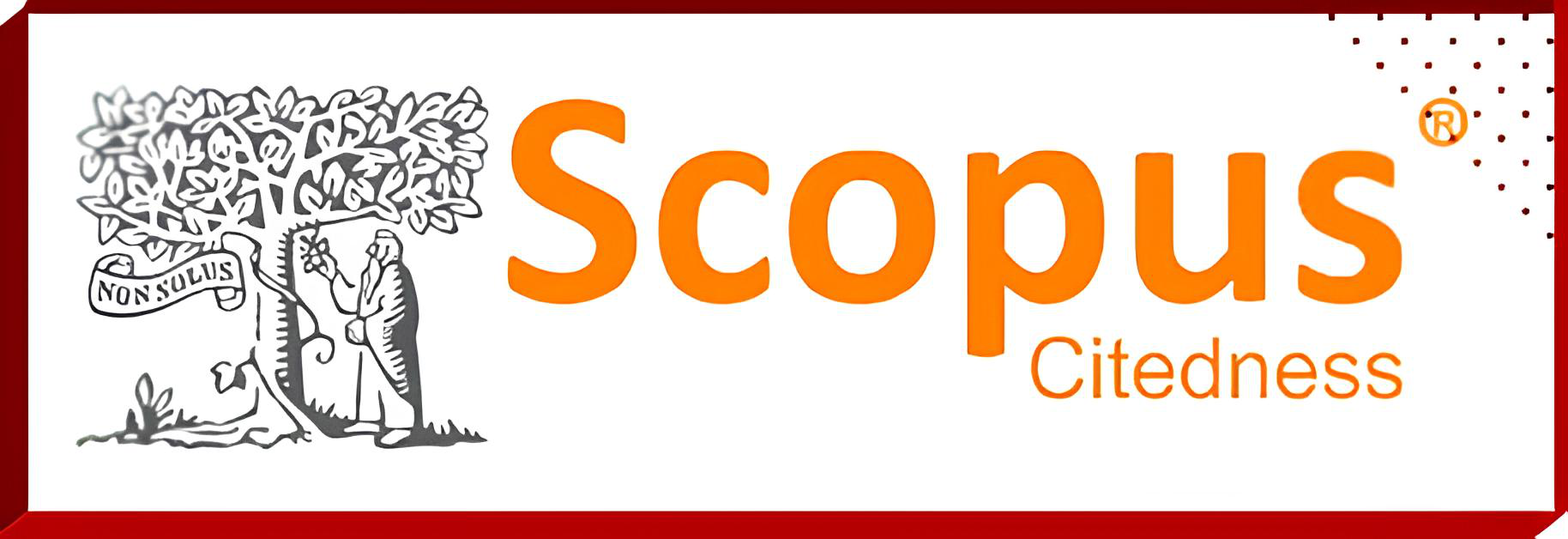Reassessing the (In)visibility of Pluricultural Competence in BIPA Assessment: A Critical Discourse Analysis of Basa-Basi Representation in Government-Issued Textbooks
 Abstract views: 236
,
Abstract views: 236
,
 PDF downloads: 148
PDF downloads: 148
Abstract
Pluricultural competence is a critical component in teaching Indonesian as a Foreign Language (BIPA), particularly within the context of intercultural communication, as reflected in the practice of basa-basi (Indonesian small talk). However, the representation of this competence in formal BIPA assessment has received limited critical attention. This study aims to evaluate the visibility of pluricultural competence through the representation of basa-basi in assessment tasks found in government-issued BIPA textbooks. Employing a descriptive qualitative approach and Fairclough’s model of Critical Discourse Analysis (CDA), the study analyzes seven official BIPA textbooks from Levels 1 and 2, with a focus on assessment sections. The findings reveal that the representation of basa-basi remains limited and fails to capture the complexity of Indonesian sociocultural interaction. Assessment items tend to prioritize structural aspects of language while overlooking pragmatic and cultural dimensions. The study concludes that insufficient attention to pluricultural competence in assessment may hinder BIPA learners from achieving full communicative competence. It recommends the explicit integration of basa-basi elements and pragmatic evaluation criteria in BIPA assessments as a step toward strengthening a culturally responsive language teaching approach.
Downloads
References
Alzhanova, A., & Chaklikova, A. (2022). Multilingual Education: Development of Professional Foreign Language Communicative Competence of Students in a Digital Environment. International Journal of Web-Based Learning and Teaching Technologies, 17(1). 1-13.
Ambarwati, A., Laksono, P. T., Wahyuni, S., & Sari, I. N. (2023). The Needs of Beginning Thai BIPA Learners on Indonesian Cultural Content. Athena: Journal of Social, Culture and Society, 1(4). 239-246.
Amin, S. (2019). The Context of ‘Basa Basi’ in Aceh Reality: Study of Indigenous Psychology. International Journal of Research Studies in Psychology, 8(1). 51-61.
Ani, I. F. K., & Suyitno, I. (2022). Ungkapan Pujian Pelajar BIPA dalam Akun YouTube BIPA Lembaga Bahasa Internasional (LBI) UI. JoLLA: Journal of Language, Literature, and Arts, 2(8). 1079-1094.
Asghar, S. A., Yasmin, T., & Rashid, A. (2021). Pragmatic Analysis of Textbooks on the Basis of Speech Acts. Review of Education, Administration & LAW, 4(2). 503-507.
Asteria, P. V., Rofi’uddin, A. H., & Yuwono, D. B. (2023). Implicatures as Pluricultural Aspects of Indonesian Context. In Proceedings of the International Joint Conference on Arts and Humanities 2023 (IJCAH 2023) (Vol. 785, p. 114). Springer Nature.
Banaruee, H., Farsani, D., & Khatin-Zadeh, O. (2023). Culture in English Language Teaching: A Curricular Evaluation of English Textbooks for Foreign Language Learners. Frontiers in Education, 8. 1-11.
Byram, M. (2023). Identity matters in the Common European Framework of Reference for Languages and its Companion Volume. Language Learning Journal, 51(2). 253-262.
Council of Europe. (2020). Common European for Languages: of Reference Framework Learning, Teaching, Assessment. In New Cambridge Modern History (Vol. 13).
Galante, A. (2022). Plurilingual and Pluricultural Competence (PPC) Scale: The Inseparability of Language and Culture. International Journal of Multilingualism, 19(4). 477-498.
Galante A. (2024). Plurilingual and Pluricultural Competence: Origins, Current Trends, and Future Directions. The Handbook of Plurilingual and Intercultural Language Learning, 333-347.
Jakupčević, E., & Ćavar Portolan, M. (2024). An Analysis of Pragmatic Content in EFL Textbooks for Young Learners in Croatia. Language Teaching Research, 28(1), 114–137.
Kentmen, H., Debreli, E., & Yavuz, M. A. (2023). Assessing Tertiary Turkish EFL Learners’ Pragmatic Competence Regarding Speech Acts and Conversational Implicatures. Sustainability (Switzerland), 15(4). 1-21.
Khaerunnisa, Muliastuti, L., Rafli, Z., & Halimah. (2024). Tailored Teaching Resources for Indonesian Language for Foreign Speakers based on Betawi Local Wisdom through Multimedia Interactive for Beginner Level. International Research Journal of Multidisciplinary Scope, 5(1).
Kyrpychenko, O., Pushchyna, I., Kichuk, Y., Shevchenko, N., Luchaninova, O., & Koval, V. (2021). Communicative Competence Development in Teaching Professional Discourse in Educational Establishments. International Journal of Modern Education and Computer Science, 13(4). 691-698.
Maharany, E. R., Laksono, P. T., & Basori, B. (2021). Teaching BIPA: Conditions, Opportunities, and Challenges During the Pandemic. SeBaSa, 4(2). 58-72.
Masyita. (2022). Analisis Tindak Tutur Direktif Mahasiswa Akper Yapenas 21 Maros dalam Berbahasa Indonesia. Nubin Smart Journal, 2(2).
Nalien, E. M. (2021). Faktor-Faktor Penghambat Implementasi Kebijakan Bureaucratic Trimming di Pemerintahan Kota Bukittinggi. Jurnal Kebijakan Pemerintahan. 1-13.
Oktavia, W., & Manaf, N. A. (2022). Strategi Bertutur dalam Tindak Tutur Ekspresif Siswa pada Proses Pembelajaran Bahasa Indonesia. Jurnal Basicedu, 6(3). 4953-4966.
Polyakova, O., & Galstyan-Sargsyan, R. (2021). Sustainable Higher Education via Telecollaboration: Improving Plurilingual and Pluricultural Competence. Integration of Education, 25(4). 544-561.
Prabowo Setyabudi, M. N. (2023). Toleransi Itu Mahal, Tidak Setiap Orang Mampu Dan Berani Membayarnya! Peradaban Journal of Religion and Society, 2(1). 1-19.
Purbarani, E., & Muliastuti, L. (2023). Development of Bahasa Indonesia for Foreign Speaker’s Learning Material Based on Indonesian Cultures-Literatures and 5C Integrated. Aksis : Jurnal Pendidikan Bahasa dan Sastra Indonesia, 7(2). 128-146.
Putikadyanto, A. P. A., Wachidah, L. R., & Sari, S. Y. (2024). Menciptakan Generasi Peduli Lingkungan: Inovasi Ekokurikulum Berbasis Kearifan Lokal Madura di SMP Pamekasan. GHANCARAN: Jurnal Pendidikan Bahasa dan Sastra Indonesia, 47-62.
Ramadhan, A. R., & Sari, V. P. (2022). Diplomasi Digital Jepang Terhadap Indonesia Melalui Akun Instagram @Jpnambsindonesia Pada Periode Duta Besar Masafumi Ishii Dalam Upaya Mengelola Citra Jepang. Padjadjaran Journal of International Relations, 4(1). 36-55.
Roekhan, Suyitno, I., Andajani, K., Martutik, & Prastio, B. (2024). Discursive Practices Instilling the Peace Values for Foreign Learners in the BIPA Textbook. Cakrawala Pendidikan, 43(1). 154-165.
Setiaji, A. B., & Fajriani, F. (2022). Analisis Wacana Kritis :Pemberitaan Konflik Rohingya di Media Komunikasi. Lingue : Jurnal Bahasa, Budaya, dan Sastra, 4(1). 51-66.
Solikhah, I., & Budiharso, T. (2020). Exploring Cultural Inclusion in the Curriculum and Practices for Teaching Bahasa Indonesia to Speakers of Other Languages. Journal of Social Studies Education Research, 11(3). 177-197.
Tiawati, R. L., Bidin, A. Bin, & Baba, S. (2023). How the Language Competence of International Students is Culturally Oriented When Learning Indonesian Language. Studies in Media and Communication, 11(6). 80-89.
Triyuono, A., & Dirham, U. R. (2023). Pragmatic Competence or Pragmatic Knowledge and Its Role in Linguistic Communication. Journal of Learning and instructional Studies, 2(3). 93-106.
Wahdaniyah, S., Nensilianti, & Syukur Saud. (2023). Analisis Latihan Menulis Level Mahir dalam Buku Sahabatku Indonesia untuk Umum. Jurnal Onoma: Pendidikan, Bahasa, dan Sastra, 9(2). 826-831.
Yani, W. O. N. (2020). Perilaku Komunikasi Gegar Budaya pada Mahasiswa Asal Indonesia yang Studi di Jerman. DIALEKTIKA, 7(1). 117-130.
Yulianeta, Y., & Siddique, M. (2024). Strategies and challenges of teaching Indonesian to foreign speakers at Bandung State University. AMCA Journal of Community Development, 4(1).
Copyright (c) 2025 GHANCARAN: Jurnal Pendidikan Bahasa dan Sastra Indonesia

This work is licensed under a Creative Commons Attribution-ShareAlike 4.0 International License.
Ghancaran: Jurnal Pendidikan Bahasa dan Sastra Indonesia uses an Open Access Policy under the Creative Commons Attribution-ShareAlike 4.0 International License. Authors publishing in this journal agree to the following terms:
- Ghancaran Journal holds the copyright and grants the journal rights for first publication with the work simultaneously licensed under a

The work is distributed under Creative Commons Attribution-ShareAlike 4.0 International License which allows others to share, copy, and redistribute the material in any media or format and adapt, remix, change, and develop the material even for commercial purposes, as long as it is stated credit and license derivative works under similar terms. - Authors may make additional contractual arrangements for non-exclusive distribution of the journal's published work version.
- Authors are permitted to post their work online (e.g., in institutional repositories or on their websites) before and during submission, as doing so may lead to productive exchange.



















